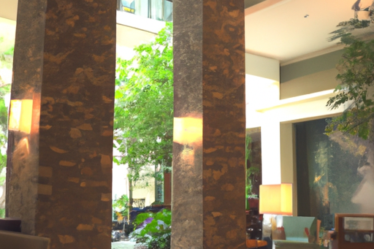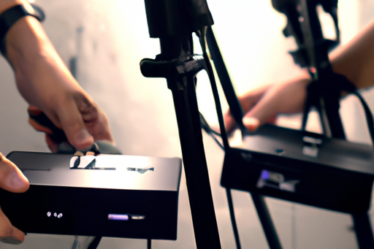
Analyzing the Impact of Recession Fears on ADR and Group Demand in the Hospitality Industry
The hospitality industry has always been sensitive to economic fluctuations, and the current climate is no exception. As recession fears loom, industry professionals are closely monitoring the impact on average daily rate (ADR) and group demand. While there is a sense of apprehension, there is also a glimmer of hope as industry sentiment remains cautiously optimistic.
Recession fears have been fueled by a variety of factors, including trade tensions, geopolitical uncertainties, and slowing global economic growth. These concerns have led to a decrease in consumer confidence and a tightening of corporate budgets. As a result, many businesses are cutting back on travel expenses, which directly affects ADR and group demand in the hospitality industry.
ADR, a key performance indicator for hotels, is a measure of the average price paid per room. During a recession, consumers tend to be more price-sensitive and look for more affordable options. This puts downward pressure on ADR as hotels are forced to lower their rates to attract guests. Additionally, corporate clients, who often contribute significantly to group demand, may reduce their travel budgets or cancel planned events altogether.
Despite these challenges, industry professionals are cautiously optimistic about the future. They believe that the hospitality industry has become more resilient and adaptable since the last recession in 2008. Hotels have learned valuable lessons from that experience and have implemented strategies to mitigate the impact of a potential downturn.
One such strategy is diversification. Hotels are expanding their target markets beyond traditional business travelers and are actively pursuing leisure travelers and group bookings from different sectors. By diversifying their customer base, hotels can reduce their reliance on any one segment and better weather economic uncertainties.
Another strategy is value-added services. Hotels are focusing on providing unique experiences and personalized services to differentiate themselves from competitors. By offering added value, such as complimentary breakfast, free Wi-Fi, or access to exclusive amenities, hotels can justify higher ADRs and attract guests who are willing to pay for a superior experience.
Furthermore, industry professionals are closely monitoring the pulse of the economy and adjusting their pricing and marketing strategies accordingly. By staying informed about market trends and consumer behavior, hotels can make data-driven decisions to optimize ADR and group demand. This proactive approach allows them to stay ahead of the curve and adapt quickly to changing economic conditions.
In conclusion, recession fears are causing some uncertainty in the hospitality industry, particularly in terms of ADR and group demand. However, industry professionals remain cautiously optimistic and are implementing strategies to mitigate the impact of a potential downturn. By diversifying their customer base, offering value-added services, and staying informed about market trends, hotels are positioning themselves to weather economic uncertainties and continue to thrive. While challenges may lie ahead, the hospitality industry is resilient and adaptable, and there is hope for a positive outcome amidst the growing recession fears.
Strategies for Navigating Recession Fears and Maintaining ADR and Group Demand in the Current Market

As the global economy faces growing recession fears, the hospitality industry finds itself in a precarious position. However, amidst the uncertainty, there is a glimmer of hope as industry sentiment remains cautiously optimistic about ADR (Average Daily Rate) and group demand. In this article, we will explore strategies for navigating recession fears and maintaining ADR and group demand in the current market.
One key strategy is to focus on providing exceptional customer service. In times of economic uncertainty, guests are more likely to choose hotels that offer a superior experience. By going above and beyond to meet their needs and exceed their expectations, you can build a loyal customer base that will continue to choose your hotel even during a recession.
Another important strategy is to diversify your revenue streams. Relying solely on ADR and group demand can be risky during an economic downturn. Consider exploring other avenues such as partnerships with local businesses, offering unique experiences or packages, or targeting niche markets. By diversifying your revenue streams, you can mitigate the impact of a potential recession and ensure a steady flow of income.
Additionally, it is crucial to stay ahead of the competition by continuously monitoring market trends and adjusting your pricing strategies accordingly. During a recession, guests become more price-sensitive, so it is important to find the right balance between maintaining ADR and attracting customers. Consider offering value-added services or discounts to entice guests without compromising your bottom line.
Furthermore, building strong relationships with corporate clients can be a valuable asset during a recession. Corporate travelers often have more stable travel budgets and are less likely to cut back on business trips. By offering tailored services and incentives to corporate clients, you can secure a steady stream of group demand even in challenging economic times.
In order to maintain ADR and group demand, it is essential to invest in marketing and promotion. During a recession, many businesses cut back on marketing expenses, which can lead to a decline in bookings. By maintaining a strong online presence, leveraging social media platforms, and implementing targeted marketing campaigns, you can ensure that your hotel remains top of mind for potential guests.
Lastly, it is important to focus on cost control and operational efficiency. During a recession, every dollar counts, and finding ways to reduce expenses without compromising the quality of service is crucial. Evaluate your operational processes, negotiate better deals with suppliers, and implement energy-saving initiatives to minimize costs and maximize profitability.
In conclusion, while recession fears loom over the global economy, the hospitality industry can take proactive steps to maintain ADR and group demand. By focusing on exceptional customer service, diversifying revenue streams, monitoring market trends, building strong relationships with corporate clients, investing in marketing, and controlling costs, hotels can navigate the challenges of a potential recession and emerge stronger on the other side. Remember, a friendly and informative approach will help you build trust with your guests and position your hotel as a reliable choice even in uncertain times.
Exploring the Relationship Between Industry Sentiment and Recession Fears in ADR and Group Demand
The global economy has been facing some uncertainty in recent months, with growing fears of a recession on the horizon. However, amidst these concerns, there is a glimmer of hope in the hospitality industry. Industry sentiment for ADR (average daily rate) and group demand remains positive, suggesting that there may be some resilience in the face of economic downturns.
ADR is a key metric in the hotel industry, representing the average rate paid per occupied room in a given time period. It is an important indicator of a hotel’s financial performance and can be influenced by various factors, including supply and demand dynamics, economic conditions, and consumer behavior. Despite the looming recession fears, industry sentiment for ADR remains optimistic.
One reason for this positive sentiment is the increasing demand for experiential travel. Today’s travelers are seeking unique and immersive experiences, and they are willing to pay a premium for it. This trend has been driving up ADR in many destinations, as hotels offer curated experiences and personalized services to cater to these demands. As long as hotels continue to innovate and provide exceptional experiences, there will likely be a steady demand for higher-priced accommodations.
Another factor contributing to the positive industry sentiment is the growth in group demand. Group bookings, such as conferences, conventions, and corporate events, can have a significant impact on a hotel’s revenue. Despite the economic uncertainties, companies and organizations still need to hold meetings and events, and hotels are well-positioned to cater to these needs. The ability to offer comprehensive event planning services, state-of-the-art facilities, and attractive group rates makes hotels an attractive choice for event organizers.
Furthermore, the rise of bleisure travel has also been driving group demand. Bleisure travel refers to the combination of business and leisure travel, where professionals extend their business trips to include some leisure activities. This trend has been gaining popularity as more companies recognize the importance of work-life balance and encourage their employees to take time off for personal enjoyment. Hotels that can offer a seamless transition between work and play, with amenities and services that cater to both business and leisure travelers, are likely to see an increase in group bookings.
While the industry sentiment for ADR and group demand remains positive, it is important to acknowledge the potential impact of a recession. Economic downturns can lead to reduced consumer spending, corporate budget cuts, and a decline in business and leisure travel. These factors can put pressure on ADR and group demand, as travelers become more price-sensitive and companies scale back on events and conferences.
However, the hospitality industry has proven to be resilient in the face of economic challenges in the past. Hotels have the ability to adapt and adjust their strategies to attract and retain customers, even during tough times. By focusing on value-added services, cost-effective marketing initiatives, and targeted promotions, hotels can mitigate the impact of a recession and maintain a steady stream of ADR and group bookings.
In conclusion, while recession fears loom over the global economy, the hospitality industry remains hopeful. Industry sentiment for ADR and group demand remains positive, driven by the demand for experiential travel, the growth in group bookings, and the rise of bleisure travel. While a recession may pose challenges, hotels have the ability to adapt and navigate through tough times. By focusing on providing exceptional experiences and value-added services, hotels can weather the storm and continue to thrive in the face of economic uncertainties.


